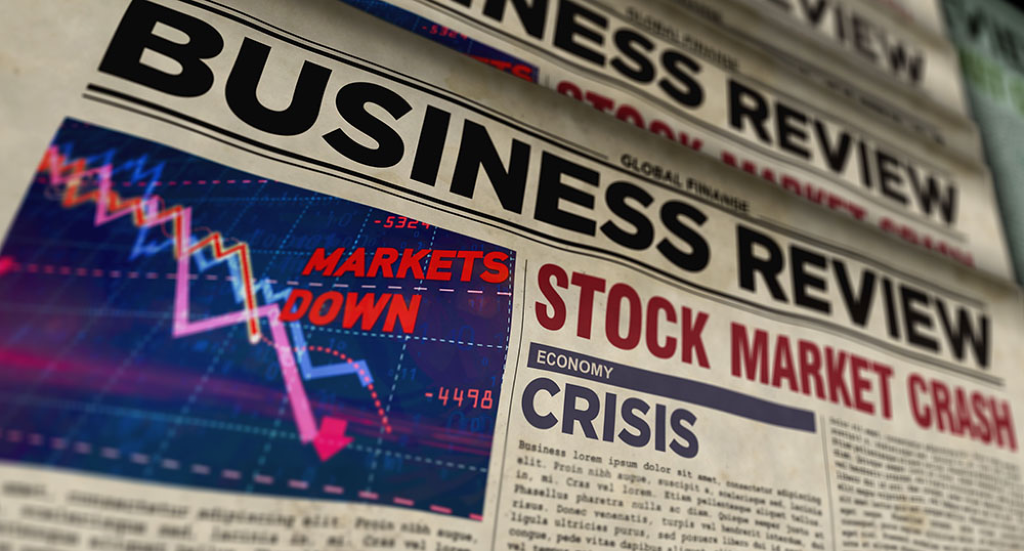The Dotcom Bubble | Financial Flashback

- The Dotcom Bubble was a financial bubble in the stock market that caused tech companies' stock prices to be overpriced from 1995 to 2000.
- The stocks were overpriced because many investors speculated the internet would become a significant part of our lives and, thus, were investing heavily in these companies.
- Most of these tech companies listed on the stock market had yet to make a profit, resulting in investors quickly realizing that many of these companies were worth much less than their stock price, causing a downfall that saw NASDAQ's value plummet by 75%.
Throughout history, there have been a couple of significant instances that resulted in the stock prices of various companies falling significantly in a short period of time. Therefore, it is essential to review these historical events to better understand what caused the issue, its impact, and discuss other similar financial events. In this case, the historical event being reviewed is the Dotcom Bubble, which plummeted tech stocks of various companies, some of which are still around today.
History of the Dotcom Bubble
Between 1995 and 2000, the NASDAQ Composite Index, which tracks most of the stocks traded on its stock exchange, rose by 582%. The reason tech companies were beginning to grow in popularity was due to the increased use of the internet. As these internet-based companies were slowly playing a more prominent role in our daily lives, many speculated these companies would play a significant role in the future.
Recommended Read: How the Stock Exchange Works | Investing for Beginners
Consequently, many people began investing heavily in these companies, from regular investors to stockbrokers on Wall Street and venture capitalists.

What Caused the Stock Market to Crash?
Ultimately, the bubble burst by 2002, as the price of the NASDAQ Composite Index saw a 75% decline from its peak in March 2000 of $5,132.52. The crash left many companies declaring bankruptcy and going out of business, with few tech companies being able to keep their head above water and surpass this crash.
A couple of key issues were made by a large sum of investors, which resulted in the market ultimately crashing.
Speculative Investing
One key issue that many investors made that played a significant role in the market crashing was a large sum of speculation involved when making investments. Of course, investments in the stock market are speculative. However, public information is available to help the investors receive more information prior to investing to mitigate the risk they will be taking on.
However, during the Dotcom Bubble, investors began abandoning this investing philosophy. Typically, venture capitalists would look at a company’s earnings, financial ratios, and cash flow statements to determine how well a company was performing. Yet, as many investors had seen a substantial increase in the price of tech stocks, they were eager to invest in smaller companies to obtain higher capital gains. Thus, due to the surge in investments, many startups met with venture capitalists to retain capital to start their company and ultimately take it public.
Unfortunately, due to the recent rapid growth of dot com companies, private investors were not looking at financials. As they had seen, from previous instances, the business model employed by these companies had worked out successfully. Consequently, small companies, who had yet to make a profit or even produce a finished product, were receiving high volumes of venture capital money, which eventually helped them take the company public through an initial public offering (IPO).
Overconfidence in the Market
One other fundamental mistake attributed to the stock market crash was the overconfidence many had in the market. When investors see the stock market performing exceptionally well for a prolonged period of time, there is a sense of euphoria as they are too happy about making constant money and do not take a moment to look at what is causing the market’s value to rise.
However, as many investors did not take the time to look at the market from an objective point of view, this led to the eventual downfall of the stock market, wiping out nearly $5 trillion.
Recommended Read: The Scale Is In The Start: Investing Within Your Paycheck
The Outcome of the Crash
The outcome of the crash was that many companies within the tech sector had to file for bankruptcy and eventually close down their businesses. In addition, many corporations who are still around today that experienced the crash saw their stocks experience a massive tumble in their price. Companies such as Amazon, Intel, and eBay have experienced this financial tragedy but were able to endure it.
Lesson Learned from the Dotcom Bubble
The main lesson from this major financial crisis is always to be mindful when investing in the stock market. One of the leading causes of a stock market crash is the lack of research done by investors prior to investing money into a company. As such, many of the investors during the dotcom bubble burst era did not look at the financials or other significant factors. As a result, many lost most of their initial investment in the long run.
Similar Financial Events
It is important to look at the history of the stock market and determine what the causes were which caused it to crash. However, due to past and current events, it is evident that history does indeed repeat itself, such as the United States housing market crisis of 2008. The housing market crash is similar to the Dotcom Bubble because many companies involved in the crash once again had a euphoric mentality and were not concerned about the potential decline in the market.
The Dotcom Bubble was not a good time for investors as it eventually resulted in the majority of them losing a large portion of their investments. However, it is crucial to note that the market crashed because investors were more focused on the hype of the internet and tech stocks and did not focus on doing the typical analyses they would have done for other industries.
Thus, this market crash infers a vital message, always research thoroughly before investing because if you do not, it may result in you losing money.
What are your thoughts on the Dotcom Bubble? Do you believe that these types of instances may occur sometime in the future when a new industry shows signs of promise? Share your thoughts with us in the comment section below.